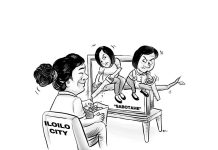
POLITICAL sensitivity is at an all-time high now that the May 2025 elections is drawing near, thus the role of public perception in shaping trust in institutions cannot be overstated. This is particularly true for law enforcement agencies, like the Philippine National Police (PNP), which are at the frontline of maintaining peace and order during politically charged periods. The PNP’s policy of reassigning officers with political relatives is a timely and necessary step in managing public perception. But while this measure aims to prevent accusations of bias, it also raises broader questions about the delicate balance between public trust and institutional integrity in an increasingly polarized environment.
The public’s confidence in law enforcement is crucial, especially during elections when tensions run high, and the stakes are enormous. Perception often shapes reality in such scenarios. Even if officers are carrying out their duties with utmost professionalism, any hint of bias — whether real or imagined — can undermine the credibility of the entire electoral process. A single instance of perceived favoritism, no matter how minor, has the potential to snowball into widespread doubt about the fairness of the election. This is where proactive measures, like reassignment, become vital.
By reassigning officers with political relatives, the PNP acknowledges the influence of public perception in maintaining an impartial image. In a time when political affiliations can quickly become flashpoints for division, such steps are necessary to safeguard the police from allegations of partisanship.
Managing public perception also requires consistent communication and transparency. The public must be informed about the steps being taken to preserve neutrality. Clear explanations of why certain policies are in place — such as the reassignment of officers — will help the public understand that these measures are designed to protect the integrity of the election, not to single out specific individuals.
Equally important is the need for accountability. Reassignment is only effective if it is part of a broader culture of neutrality and professionalism within the PNP. Public trust cannot be earned by optics alone. The public needs to see that law enforcement agencies are holding themselves to the highest standards of impartiality. Officers who engage in partisan activities, directly or indirectly, must face consequences, not only to preserve institutional integrity but also to send a clear message that the police force serves the people — not political interests.
At the same time, it is important to recognize the personal challenges that law enforcers face, especially in local communities where the lines between professional duty and personal relationships can blur. Police officers often serve in areas where they have deep familial and social ties, making reassignment a difficult yet necessary step to maintain public trust. It is essential for the PNP to provide support for officers undergoing these transitions, ensuring that they are treated fairly while still upholding the public’s expectation of neutrality.
In today’s politically charged environment, public perception is a central factor in maintaining the credibility of both the police and the electoral process. Transparency and accountability are essential in ensuring that the police can perform their duties without being dragged into the political fray.







